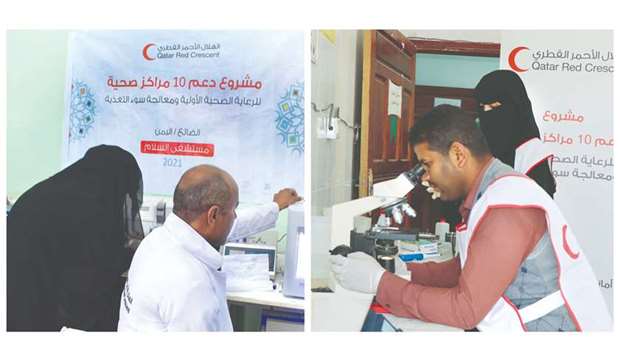Qatar Red Crescent Society (QRCS) recently launched a new project to support 10 primary healthcare and malnutrition treatment centres in Yemen.
Lasting until the end of the year end, the $988,000 project covers the governorates of Taiz, Sana’a, and Dhale.
During the inauguration ceremony of the Maternity and Childhood Centre, Dr Rajih Abdul-Wahid al-Maleeki, the general director of the Health and Population Office in Taiz, emphasised the importance of the project in serving low-income people, amid economic challenges in Taiz and the country in general.
He thanked the QRCS for its previous and current donations, including medical equipment, consumables and medications.
Al-Maleeki said that this project shows how the QRCS is always concerned with effective and successful projects.
Dr Hmoud al-Shami, the centre’s director, revealed a jump in the number of visitors since the return of the QRCS.
“The staff are active again and the QRCS is supporting the centre to back community health,” he said. “It is important to promote coronavirus (Covid-19) awareness and advising activities for different segments of society."
Dr Azya Rawah, the project’s supervisor at the QRCS’s mission in Yemen, gave a presentation on the activities and interventions to be done.
She expects the results to be better than the last time.
In Dhale, Dr Mothana Said, the director of the Health Office in Qa'tabah district, said: “This health project will help Al Salam Hospital in Qa'tabah district and Al Shohadaa Hospital in Al Shu'ayb district.”
“It supports the departments of general emergency with medications, medical solutions, logistics and staff remunerations,” he added.
He commended the QRCS’s generous contributions to the health sector, saying: “In 2018-2019, the QRCS rehabilitated, furnished and operated six health centres in Qa'tabah alone.”
“We welcome such effective health projects, which have a positive and long-term effect on the treatment of patients and rehabilitation of health facilities, thus ensuring integrated health services," the official added.
Project manager Ahmed al-Moqanza’ spoke about the positive outcomes of these services, as reflected in the increase in visitors to the centres.
“The project pays for the remuneration of medical and administrative staff, recruits the required staff, secures supportive services such as water supply, power supply and maintenance, and procures medical equipment and basic medications for poor,” he said. “It is estimated to serve up to 250,000 patients, in addition to 30,000 beneficiaries of health education.”
The United Nations Global Humanitarian Overview 2019 shows that only 51% of health facilities in Yemen are fully functional, which means limited access to healthcare.
According to the report, famine mortality is associated with immune deficiency diseases.
Many malnourished children, mothers and patients in famine zones may therefore have no access to healthcare.
To the QRCS, it is a top priority to meet the fundamental needs of hospitals and health centres.
The project is aimed at building the resilience of Yemeni community in the face of the current crisis, by providing primary healthcare services, eradicating malnutrition, maintaining premises and equipment, and promoting health awareness.
During the inauguration ceremony of the Maternity and Childhood Centre, Dr Rajih Abdul-Wahid al-Maleeki, the general director of the Health and Population Office in Taiz, emphasised the importance of the project in serving low-income people, amid economic challenges in Taiz and the country in general.
He thanked the QRCS for its previous and current donations, including medical equipment, consumables and medications.
Al-Maleeki said that this project shows how the QRCS is always concerned with effective and successful projects.
Dr Hmoud al-Shami, the centre’s director, revealed a jump in the number of visitors since the return of the QRCS.
“The staff are active again and the QRCS is supporting the centre to back community health,” he said. “It is important to promote coronavirus (Covid-19) awareness and advising activities for different segments of society."
Dr Azya Rawah, the project’s supervisor at the QRCS’s mission in Yemen, gave a presentation on the activities and interventions to be done.
She expects the results to be better than the last time.
In Dhale, Dr Mothana Said, the director of the Health Office in Qa'tabah district, said: “This health project will help Al Salam Hospital in Qa'tabah district and Al Shohadaa Hospital in Al Shu'ayb district.”
“It supports the departments of general emergency with medications, medical solutions, logistics and staff remunerations,” he added.
He commended the QRCS’s generous contributions to the health sector, saying: “In 2018-2019, the QRCS rehabilitated, furnished and operated six health centres in Qa'tabah alone.”
“We welcome such effective health projects, which have a positive and long-term effect on the treatment of patients and rehabilitation of health facilities, thus ensuring integrated health services," the official added.
Project manager Ahmed al-Moqanza’ spoke about the positive outcomes of these services, as reflected in the increase in visitors to the centres.
“The project pays for the remuneration of medical and administrative staff, recruits the required staff, secures supportive services such as water supply, power supply and maintenance, and procures medical equipment and basic medications for poor,” he said. “It is estimated to serve up to 250,000 patients, in addition to 30,000 beneficiaries of health education.”
The United Nations Global Humanitarian Overview 2019 shows that only 51% of health facilities in Yemen are fully functional, which means limited access to healthcare.
According to the report, famine mortality is associated with immune deficiency diseases.
Many malnourished children, mothers and patients in famine zones may therefore have no access to healthcare.
To the QRCS, it is a top priority to meet the fundamental needs of hospitals and health centres.
The project is aimed at building the resilience of Yemeni community in the face of the current crisis, by providing primary healthcare services, eradicating malnutrition, maintaining premises and equipment, and promoting health awareness.

